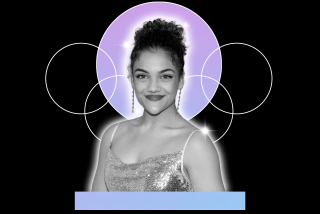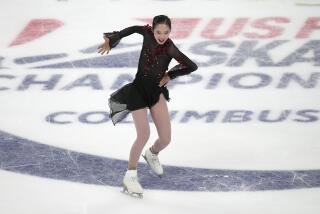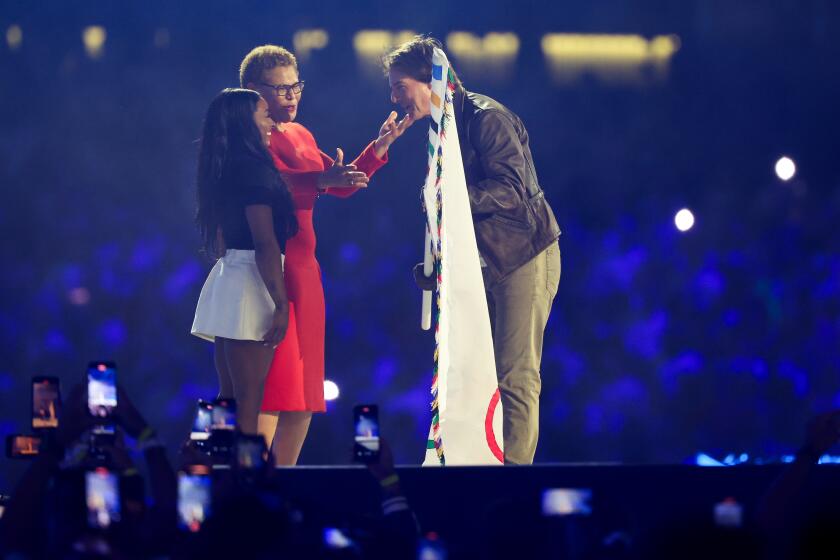Write on Schedule
If Sarah Hughes’ brothers had indulged their baby sister and dawdled when she chased them around the makeshift rink in the family’s backyard, she might not be where she is today--on the cusp of figure skating superstardom and the subject of a syrupy unauthorized biography.
Because if Hughes had caught her brothers, David and Matthew, she might have decided there was no challenge to this skating stuff and given it up. But even as a child, she loved challenges.
Family legend has it that Hughes’ mother, Amy, took her kids to a rink near their home in Great Neck, N.Y., for a day of skating, lining them up on a bench in age order to lace their skates. She put 3-year-old Sarah first, as the youngest of a brood that numbered four and later grew to six.
After Sarah’s skates were on, she eagerly ran onto the ice by herself. Afraid the adventurous toddler would get hurt if she skated alone, Amy Hughes resolved the next time to tie Sarah’s skates last, after everyone else was ready.
Sarah foiled that plan, figuring out how to tie her skates herself and heading for the ice.
And why not? She had places to go and older brothers to follow.
“I couldn’t really catch them,” she said, giggling. “That was the problem. I never skated fast enough. They would always beat me. Then I started winning, but I started becoming interested in doing spins and jumps. They stuck with hockey.”
Her brothers play club hockey at Ithaca College and Cornell, in upstate New York. But they still keep an eye on Sarah, now 16 and virtually certain to finish in the top three at this week’s U.S. Figure Skating Championships at Staples Center and win a spot on the U.S. Olympic team for the Salt Lake City Winter Games. The women’s competition begins today with the short program, worth one-third of the final score.
“Their friends watch football and hockey and basketball, and now they watch figure skating on TV because of me,” she said. “Whenever they have parties, they have to turn on the figure skating.”
Her performances usually give them another reason to party. She has enjoyed three impressive seasons, displaying increasing grace, sureness and technical proficiency.
It wasn’t so long ago that Hughes was crowned the junior national champion and was in awe of Michelle Kwan and the other skaters she had seen on TV. “Four years ago Monday,” she said.
Now, she’s in their class, having competed in 22 international events and three national championships, with 18 medals to show for her efforts.
“I’m very proud of these last four magical years,” said her coach, Robin Wagner.
Hughes opened eyes last season, when she finished second in the U.S. competition, third at the Grand Prix final and third in the World Championships at Vancouver, Canada. She followed that by taking another significant step in November, when she defeated Kwan--the U.S. and world champion--and world silver medalist Irina Slutskaya of Russia at Skate Canada.
She had come close to defeating Kwan a week earlier in Skate America. The crowd gave Hughes a standing ovation and booed the results, but she gracefully accepted the silver. She knew this sometimes infuriating sport obliged her to be superior to Kwan to get the same marks as the four-time world champion.
“Yes, but when somebody establishes themselves, they’ve earned it,” said Wagner, a former junior national competitor who became Hughes’ choreographer in 1994 and her coach in 1998. “But we’ve done it, and that’s the thing I’m so proud of in Sarah’s career, that she’s had a nice, steady, consistent climb.
“It’s been a lot of work, but over the past four years she’s made consistent progress and consistent improvement. Anytime somebody’s been a champion, as Michelle has been, for so long, it takes a ‘Wow!’ performance to win.”
When Hughes won, it changed how she perceived herself, Wagner said. “She’s in a place she hasn’t been in before. She has a new perspective, from the top of the podium.”
In her next competition, the Trophee Lalique, a fatigued Hughes fell on a triple flip in her short program but pulled up from fourth to second and qualified for the Grand Prix final at Kitchener, Canada.
At that event, which gathered the six best men, women, pairs and dance duos, she fell on a triple loop in her long program and wasn’t sharp in her first long program. She rallied with a strong final routine to finish third, but was startled to learn how highly she is esteemed when a local newspaper ran a picture of her fall with a caption describing it as a rare occurrence.
“I was surprised to see people were surprised that I fell,” she said. “At first I was surprised and kind of hurt. If you’re down, sometimes people will let everyone know. I saved it and brought it some and showed it to my mom. She was laughing.”
Her mother was also amused by the unauthorized biography, “Sarah Hughes, Skating to the Stars,” written by Alina Sivorinovsky, a TV producer and skating fan. It contains no revelations and was assembled mostly from previously published interviews. Nonetheless, it was a hit in the Hughes family.
“The lady must have written it because she knew my mom would order so many,” Hughes said.
She herself was amazed.
“I thought nobody would ever write a book about me,” she said. “I mean, I’m only 16 and I haven’t lived that long.”
But she’s packing a lot into every day.
An 11th-grade honors student, she tries to attend classes at Great Neck High. That hasn’t happened much this season, so her teachers often drop work off for her and she studies during the long drive to her training rink in Hackensack, N.J. Amy Hughes, who was diagnosed with breast cancer in 1997 and underwent a life-saving stem cell transplant, and her husband John, a lawyer who played hockey at Cornell, have kept their daughter grounded and have given her a solid sense of responsibility. She has learned to deal with heightened expectations, and that the better her results, the more intensely she’s scrutinized.
Her main technical flaw, noticed only by savvy skating observers, is she sometimes “flutzes” her triple lutz. When she launches herself into the air, she should take off from the back outside edge of her skate but instead takes off from the back inside edge. That turns the jump into a flip, which is less difficult because the entry curve of the flip and the direction of the spin in the air are the same. In a lutz, there’s a reversal of direction from the entry curve into the spin.
It’s a common flaw, but skating commentator Dick Button, a two-time Olympic gold medalist, believes it’s outweighed by her strengths.
“Of course, she flutzes, but she has a dozen other elements that are simply exquisite and that are wonderful,” he said, listing her graceful layback spin, the precise edging on her flying camel and the overall security of her skating. “Tell me what’s not to like, except the flutz?”
There’s much to like, including a solid repertoire of jumps and an intuitive feel for music. Hughes is capable of pushing Kwan this week, but she insisted she’s not thinking about winning the title, but merely making the Olympic team. Not that she hasn’t thought about prevailing.
“If I won, I don’t think I’d take it badly,” she said.
It might even give her material to write her own life story, instead of leaving it to someone else.
“She didn’t include everything,” Hughes said, laughing. “I can write some more things.”
More to Read
Go beyond the scoreboard
Get the latest on L.A.'s teams in the daily Sports Report newsletter.
You may occasionally receive promotional content from the Los Angeles Times.









